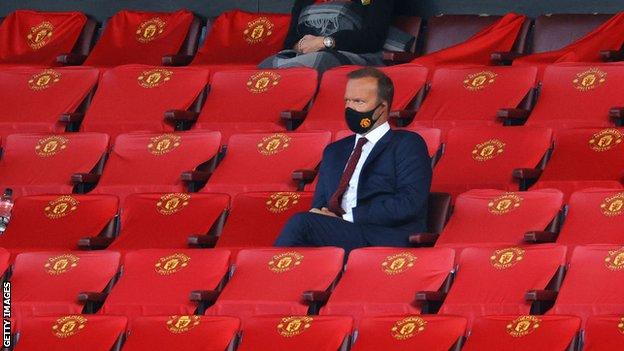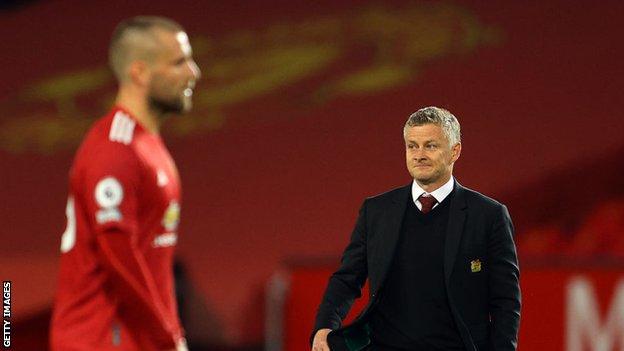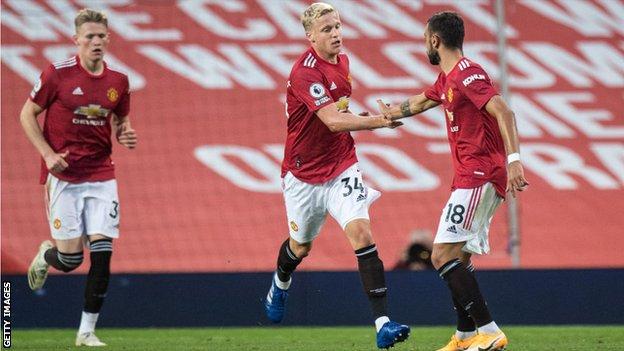
[ad_1]

There must be times when Ed Woodward wonders how his job has turned out the way it has.
About 19:20 BST on Saturday might well have been one of them.
As Manchester United’s executive vice-chairman sat in the Old Trafford directors’ box watching Crystal Palace celebrate a second successive Old Trafford win and the best top-flight start to a season in their entire history, it will not have been lost on him that one of the chief architects of the Eagles’ 3-1 victory – double goalscorer Wilfried Zaha – is a player he sold.
Around Woodward, the vast cathedral Manchester United call home remains closed to the public, while the lucrative stadium megastore stands empty, its tills silent.
He could not have imagined when he took the role in 2013, with the club champions of England, that days like this would exist.
Even before United kicked off their season against Palace, Woodward was in a tricky position.
Since the summer of 2019 he has presided over a net spend of £160m, which United believe to be more than any other major club in the world over the same period.
Yet he was still the target of an increasingly agitated supporter base dismissive of the figures, and the obvious financial impact of the coronavirus pandemic that costs United £5m in lost revenue every time they play a home game. He knew that Liverpool had just committed £65m to Thiago Alcantara and Diogo Jota. He was aware Tottenham were ready to confirm Gareth Bale’s return.
Woodward really needed United to start their season with a win. Not only did they fail, they were awful.
From his seat in the Sky television studio, former United skipper Patrice Evra was seething: “I’m burning inside. There’s so much negativity about the transfer window and the club have done nothing about it. I’m exhausted and it’s only the first day of the season.”
Ole Gunnar Solskjaer’s team selection was odd. Pairing Timothy Fosu-Mensah and Daniel James on the right when Aaron Wan-Bissaka and Mason Greenwood started on the bench weakened United. As it turned out, Fosu-Mensah was one of United’s better performers.
Throughout the side, United were poor – Anthony Martial and Marcus Rashford ineffective in attack, Paul Pogba and Bruno Fernandes shadows of what they can be in midfield, Harry Maguire and Victor Lindelof out-thought and outmanoeuvred at the back.
In fairness, as Solskjaer pointed out, even with a delayed start to their season United had only five days’ preparation time.

“Roy [Hodgson] said they had four friendlies and this was their third competitive game,” said the United boss. “It is a big difference to our one friendly against Aston Villa last week. You can see we are short.
“We need games, we need sharpness and time to get back to our best. We are going to get better but we are playing catch-up.”
In this, of all seasons, time to catch anything up is limited.
United go to Luton in the EFL Cup on Tuesday. If they win, they will not have a spare midweek until just before Christmas – and that is dependent on cup commitments.
The issue is more fundamental. United simply do not have enough good players.
Addressing the problem is the hard part.
Speak to people at United and they can reel off impressive figures for money invested in the team – £900m gross during Woodward’s watch – significant recent investment in the academy to attract youngsters of the calibre of 17-year-old Frenchman Hannibal Mejbri, who was outstanding during a 6-0 win at Salford in the EFL Trophy on 9 September.
United argue they have a strategy, which is delivering results. They also point out their self-sustaining business model demands prudence in these uncertain times.
These are solid points. But what tends to come back from those who either dismiss them or simply refuse to listen is what their current ownership model costs United.
The respected Swiss Ramble blogger said in a recent post that over the past five years, the club had paid £89m to the Glazer family in share dividends in addition to £120m in interest on its debt. What better use, these supporters ask, could United have made of the money?
In the meantime, while Solskjaer and his staff wait for new arrivals, frustration grows.
The move for Jadon Sancho is stuck, although given the 20-year-old started Borussia Dortmund’s 3-0 win against Borussia Monchengladbach on Saturday, he might be forgiven for staying where he is even if United did meet the £100m asking price.
United have held talks about Porto’s Brazilian defender Alex Telles but, again, there is no agreement over a fee and sources have suggested a deal is nowhere near as close as has been reported.
Each name brings more criticism when a signing does not follow. It seems unfair, and it probably is, but that is the landscape all top clubs operate in when results do not go their way.

For now, Solskjaer can only put on a brave face and try to get more out of the players he already has.
“We need to look from within,” the Norwegian said, when asked if he needed new signings.
“We can play so much better than today. If you look at the players we have on the pitch and on the bench and not here, we know we can perform better.
“We are always looking to improve if there is something available at the right price but we can all look ourselves in the mirror.”
[ad_2]
Source link